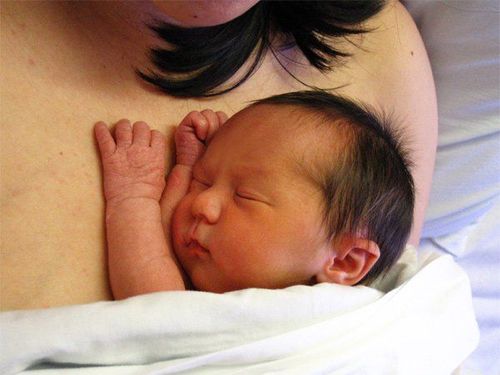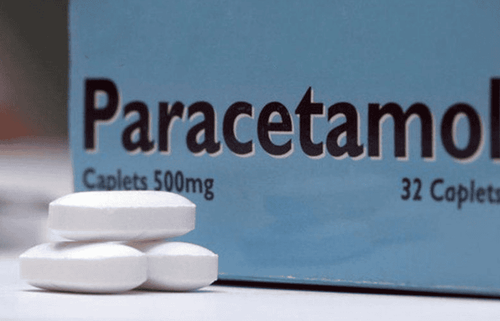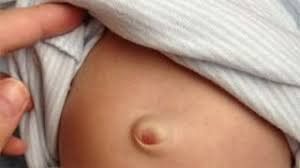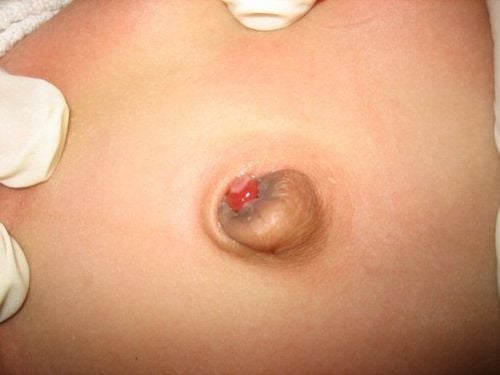This is an automatically translated article.
The article was professionally consulted by MSc Ma Van Tham - Department of Pediatrics - Neonatology, Vinmec Phu Quoc International General Hospital. He was a former lecturer in the Department of Pediatrics, Thai Nguyen University of Medicine and Pharmacy, and a doctor in the Department of Emergency and Neonatal Resuscitation at Thai Nguyen Central Hospital. Uncle has strengths in the field of Internal Medicine: Respiratory, Digestive, Nutrition, Neonatal First Aid.The period after the fall of the umbilical cord in the newborn is a sensitive period. Abnormal signs in the navel are warning of dangerous diseases. If there are any abnormal signs, it is best to take the baby to the hospital for examination.
1. Caring for the umbilical cord of a newborn baby after it falls off
Clean umbilical cord care immediately after birth and in the first few days after birth is effective in preventing umbilical cord infections.
Before and after taking care of the baby's umbilical cord, it is necessary to wash hands with clean water and soap thoroughly. It is more convenient to take care of the baby's navel right after bathing the baby, after bathing the baby; Dry the baby's body with sterile medical gauze, gently pat the baby's navel area. It is not necessary to bathe the baby every day, when the belly button hasn't fallen off, you should bathe in the "Head" and "Legs" positions to keep the navel dry.
Then put on clean clothes for the baby, keep the umbilical cord dry clean by covering it with clean clothes or now, on the market, there are sterilized baby umbilical cord bandages, change one every day. , use an elastic gauze to wrap it lightly after you have placed a clean gauze pad on the spot where the navel has dried.
Trắc nghiệm: các chỉ số cần chú ý về sự phát triển thể chất của trẻ
Chiều cao, cân nặng của bé ở từng giai đoạn nên là bao nhiêu là bình thường, bao nhiêu là bất thường? Cùng ThS.BS Ma Văn Thấm điểm lại xem bạn đã nắm được các chỉ số phát triển thể chất của bé chưa nhé!The following content is prepared under supervision of Thạc sĩ, Bác sĩ y khoa, Ma Văn Thấm , Nhi , Phòng khám Đa khoa Quốc tế Vinmec Dương Đông(Phú Quốc)
2. Be wary of abnormal signs in the navel of a newborn
2.1 Newborn umbilical cord has pus Very clear identification: The umbilical cord is swollen, the newborn umbilical cord has a bad smell, is wet, and has a discharge of pus. In mild cases of purulent umbilicus, mothers can take care at home by squeezing all the pus, using hydrogen peroxide to wash the baby's navel, dry it, sprinkle with antibiotic powder, and then bandage it.
However, if the child has more severe symptoms such as high fever, vomiting, fatigue..., the mother should take the child to the hospital for timely examination and treatment.
2.2 Umbilical Vasculitis After the baby is born, the umbilical blood vessels including 2 arteries and 1 vein will collapse and become fibrous. However, if not properly cleaned, bacteria can enter the umbilical blood vessels, causing inflammation. If you notice that the abdomen below the navel is swollen, red, and there is pus flowing from the pubic bone to the navel, the baby is at risk of umbilical artery inflammation. On the contrary, if you swipe down from the sternum to see pus flowing, the baby's risk of umbilical vein inflammation is very high. In the case of newborns with umbilical vein inflammation, the bacteria can invade nearby areas such as the liver and bile, thereby leading to very dangerous sepsis. 2.3 Umbilical Tetanus Children with umbilical tetanus will have a fever, stop feeding, then stiffen the jaw, and contract the whole body. If there is light or sound, the seizure symptoms will be more severe. In severe cases, the baby can have spasms leading to difficulty breathing and death.
2.4 Umbilical granulomatosis Although the umbilical cord of a newborn falls off early, the baby does not have a fever, the umbilical cord is not swollen or red, but the leg area is still visible. The umbilical cord has yellow fluid, the mother should pay special attention. The baby is at risk for umbilical cord granuloma. If not treated in time, it can lead to an infection of the umbilicus. In summary, the process of shedding the umbilical cord in newborns long or slow depends on the location, health as well as cleaning and care of the umbilical cord. Mothers do not need to be too worried if the baby's belly button falls out slower than the standard "schedule".
However, if any abnormal signs appear, it is best to take the baby to the hospital for examination. Umbilical infection if not treated promptly can lead to many negative effects on the baby's health.
2.5 How to prevent umbilical cord infection Right from the moment of birth, the baby should be in contact with the mother's skin so that the child can have bacteria residing on the skin that is non-pathogenic bacteria from the mother.

Breast milk should be given to babies to provide antibodies against infections. During pregnancy, pregnant women should be vaccinated against tetanus to avoid tetanus in babies. In addition to paying attention to the problem of umbilical cord infection, in the period from 0 to 1 month old, parents need to take care of their baby more meticulously and carefully because the baby is very susceptible to many diseases due to the immature immune system. This is also the golden period to carry out tests and screenings to detect dangerous diseases. To protect the baby's health, right after birth, parents need to:
Echocardiography after birth early, detect congenital heart even if there are no heart abnormalities during pregnancy. Performing postpartum screening helps to detect dangerous diseases such as congenital hypothyroidism, G6PD enzyme deficiency, congenital adrenal hyperplasia, congenital hearing loss. Vinmec is currently one of the few hospitals that perform echocardiography for newborn babies, has a team of doctors specializing in echocardiography and treating cardiovascular diseases in children, helping to detect congenital heart diseases accurately. , timely intervention treatment. In addition, Vinmec provides a full range of postpartum screening services such as: Heel blood collection, Venous blood test to detect early, accurately 3 dangerous diseases in newborns only when the baby is 3-7 years old. day old. When detecting any health problems of the baby, the team of doctors at Vinmec will advise on the treatment direction with a full range of specialized specialties, helping the baby get the best treatment.
If you have a need for medical examination at Vimec Health System nationwide, please make an appointment on the website to be served.














